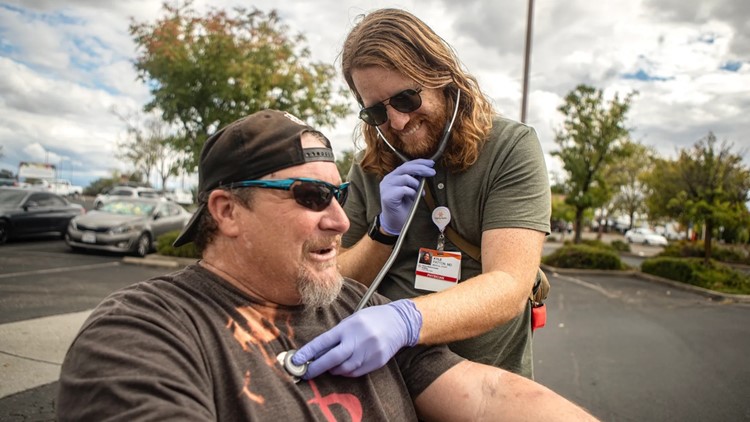CALIFORNIA, USA — It’s not healthy to be homeless. California’s more than 170,000 unhoused people often lack the means and mobility to locate and visit a doctor who will accept them — so conditions fester until they need emergency treatment.
That’s inhumane and inefficient: More than half of the state’s $133 billion Medi-Cal budget is spent on the top 5% of high-needs users.
Trying to change things, the state’s Health Care Services Department is throwing its support behind street medicine teams. It’s encouraging insurers to fund and partner with organizations that bring medical care straight into encampments, and as of November, allowing those teams to get reimbursed by tapping into and managing homeless patients’ Medi-Cal benefits.
At least 25 teams now operate throughout California, strapping on backpacks filled with medical supplies and meeting homeless people where they are. Most teams stress continuity — visiting the same patients in the same places, at regular intervals. They also include community health workers, who hand out food and hygiene supplies and help people overcome hurdles to obtaining aid and housing.
This project, a collaboration between CalMatters and CatchLight, attempts to capture what street medics are doing in Los Angeles, Bakersfield, and Redding.
In the nation’s second-most populous city, the street medicine program at the University of Southern California’s Keck School of Medicine combs the neighborhoods. These teams deliver health care to people experiencing homelessness on the streets, in the riverbeds, under bridges, or wherever terrains they reside in the vast Los Angeles County. In addition to distributing medications, taking blood samples, performing ultrasounds, and treating behavioral health and substance use disorders, the four USC Street Medicine teams offer full-service primary care on the streets.
A key is to develop a relationship and understanding of the routines of unhoused people, according to physician assistant Brett Feldman, who directs the teams. This is essential in Los Angeles, a vast region where patients move or are moved, up to four times a month to avoid street cleanings, camp sweeps, or dangerous conditions.
“In almost all oppressed people, you see similar things where… There’s nowhere physically for you to put your body,” Feldman said. “So you’re constantly being told that you’re less than human. You’re eating things that humans shouldn’t eat, sleeping places where humans shouldn’t sleep, you’re not allowed in places where other humans are, you go into a restaurant, they kick you out,” Feldman continued. “And so you start to believe that about yourself, that you’re less than human. And so you do things to survive that you’re not proud of.”
Feldman said the first step is to recognize the humanity of his patients. “And that’s done first with an act of love…after that, you bring the medical care.” One of his patients, nicknamed Uncle Frank, is in constant need of his attention but doesn’t trust doctors, Feldman said, but he does allow Feldman to check up on him on one condition: Bring him a Coke. So each day, Feldman goes to the store and picks up a bottle of soda and gives it to Uncle Frank before he begins his examination.
“People don’t go out onto the street; they get pushed out onto the street,” said Feldman. “If we went through what they went through, we’d be worse off than them even; we would do worse things than they were doing.”
Physician assistant Brett Feldman and Community Health Worker Michael Gallegos walk through Elysian Valley Park, up a wooded hill between a park and a viaduct above Highway 110. Just over the hill lies a set of encampments where Feldman’s patient Carla Bolen stays. The 52-year-old Bolen said she came to California from Florida in September and has been homeless for most of her life. The team first encountered Bolen in an encampment near city hall and assisted her with her leg pain. After a man attacked her there, she relocated to the camp above the highway. During February, working with Project Homekey, the street medicine team got her a room to stay in the Imperial Inn. Bolen said the team, whom she describes as a family to her, has helped her get her life back by getting her off the streets and finding her housing. “It’s a total change going from living outside to inside. You got to train yourself to where you were before you became homeless,” Bolen said. ”Like paying bills or picking up your medication. You can’t be lazy when you want your life back, and I prefer not to be lazy because I want my life back.” As of May, the team moved her into an apartment.
For the full story, click here.
WATCH RELATED: San Diego’s new homeless camping ban could possibly face legal hurdles



